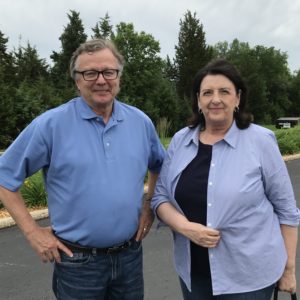Soy and grain industry leaders gather for U.S. SOY Global Trade Exchange and Specialty Grains Conference
Last week, over 800 soy and grain industry leaders, buyers and suppliers from 53 countries gathered in Chicago for the U.S. SOY Global Trade Exchange and Specialty Grains Conference (GTE). The event was co-hosted by the U.S. Soybean Export Council (USSEC) and Specialty Soya and Grains Alliance (SSGA).
With 52 trade show exhibitors, attendees were able to network and share ideas on how to move the industry forward.
“The trade show is a chance for us to meet new customers and discuss the quality and availability of products that are grown in the U.S.,” says Brandon Bickham, export sales manager for The DeLong Co., Inc.
Aside from the trade show, plenary sessions and breakout sessions allowed attendees to network and learn from experts in the soy and grain industry. Sessions were held on a variety of topics such as trade, crop production and supply, shipping, communications and more.
“We were honored to have USDA Under Secretary of Agriculture for Trade and Foreign Agricultural Affairs Ted McKinney address the crowd at GTE, says SSGA Executive Director Eric Wenberg. “McKinney and the other speakers at GTE presented critical topics being faced by those in the grain, soy and shipping industries. We have to export to survive and we need better agreements, faster.”
Pradnya Joshi, trade editor for Politico, led a conversation with Professor Mary Lovely from Syracuse University, on the future of trade. Lovely reported the need to stay positive on the current state of world trade.
“Traditionally, the United States has led the way in trying to make these trade agreements happen and maintain these open markets. We have taken our market access for granted,” Lovely said. “Policy has changed in all of those dimensions. There are large stakes at play and we need to focus on a positive outcome. If we get some decent policy, there is no reason why this trade expansion shouldn’t be robust. A recent survey shows that 62 percent of Americans support free trade and we need to keep educating about the benefits of working in trade with other countries.”
Breakout sessions included a panel presentation featuring four U.S. food soya exporters about the 2019 crop production outlook. Panel members included Sheila Sauve, Healthy Food Ingredients, Chase Holoubek, Scoular, Austin DeLong, The DeLong Co., Inc.; and Michael Youmans from Clarkson Grain Company. Gary Williams from United Grain Corp. moderated the panel.
Although they represent four different soybean-growing regions, panel members presented very similar outlooks.
“Overall, soybeans in the U.S. faced early rain and late planting, which led to many acres of Prevented Plant,” Holoubek says. “This year, September will likely be the most important month for the growing soy crop. Typically August is the most important.”
Another breakout session featured panel members from three major container shippers: Cameron Bowie, Hapag-Lloyd, Allen Clifford, Mediterranean Shipping Co. (MSC), and Paul Lesnefsky from Ocean Network Express (ONE). The panel discussed current trends and challenges in the global container shipping industry.
Bruce Abbe, SSGA Strategic Advisor for Trade and Transportation, moderated the panel.
“Global container shipping, like U.S. agriculture, is feeling the sharp impact of the trade war between China and the U.S. The normal trade lanes of imports bringing in manufactured products from China, and ag exports back from the U.S. are undergoing change,” Abbe sai. “We heard about the logistics challenges the shipping lines face needing to reposition empty equipment back to China from our new target markets in other countries.”
Shippers in the audience also heard more about the upcoming cost increases coming starting next year with the International Maritime Organization’s worldwide mandated use of low sulfur fuels or other pollution preventing technologies. MSC’s Allen Clifford called out the need for investment in the whole transportation infrastructure, “without more infrastructure at every level, trade will be something harder and harder for America.”
“Chicago is the inland center for container shipping in the U.S., and we were privileged to have a panel of very high level carrier leaders who are well informed about the trends underway,” added Abbe. “SSGA staff also invested time conferring with them separate from the conference session on some potential new developments for expanding intermodal shipping in the Midwest that hold promise.”




